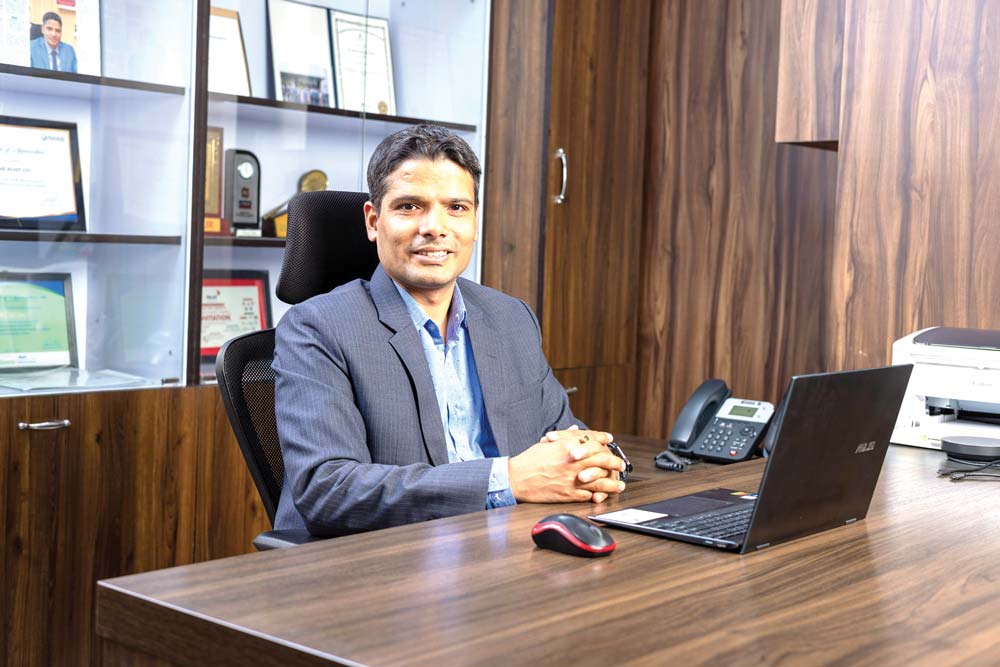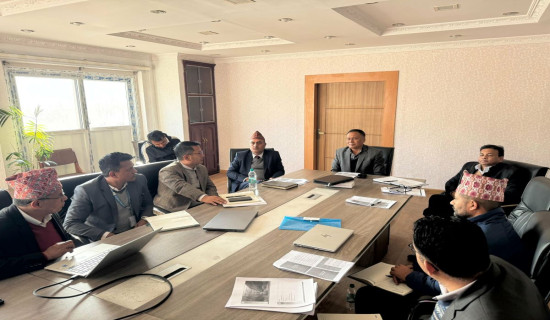- Thursday, 8 January 2026
Paudel's Tech-driven Leadership In Finance
In 2012, Khilendra Paudel served as branch supervision manager at IME (M) Sdn. Bhd. in Kuala Lumpur, Malaysia, and identified the significant potential of technology to revolutionise business operations, particularly within the financial sector. The IME (then known as International Money Express) was the first remittance company of Nepal and began to revolutionise the industry by formalising the inflow of remittance, which has become the backbone of the economy for the last couple of decades. Although he had a brief stint in a managerial position at the IME before his departure to Malaysia, the industry was yet to adopt the latest innovations in business.
Paudel was elevated to Manager of IME Limited in Nepal by the end of 2013 and promoted to Senior Manager, then General Manager in 2019. When he was appointed the CEO of the country's first and largest remittance company in 2022, he had already travelled to many countries to expand the business and observe the application of technology and strategy in the remittance sector.
During his trips, observations, and interactions with peers and experts abroad, he noticed that they had been diverting their focus, investment, and strategies to technology and reshaping business. "They were investing in technology-driven evolution of their businesses, which had not only reduced the cost of business and enhanced the efficiency but also helped make the services customer-centric," he said.
It's not that the IME was lagging in technology adoption, but there was much to be done. Sooner or later, the company had to compete with domestic remittance companies and international giants – the sector would be one of the significant financial service businesses in the coming years.
With the realisation of the same, Paudel began to work with his team at the IME to make the remittance seamless and real-time so that the money could be instantly received at any other location after sending from one location. He now thinks his gradual yet significant elevation to a higher job portfolio might be backed by his interest, knowledge, expertise, and vision to bring in and implement the financial and technological solutions.
At the IME, he worked on solutions like digitalised services to transition the traditional remittance operations to digital, mobile, and web platforms, which enabled faster, safer, and transparent money transfer. Likewise, an integrated real-time tracking system was also introduced, which, according to Paudel, was launched to ensure transparency and trust between the senders and receivers. "We also developed strategic global partnerships and integrated IME's systems with global remittance and fintech platforms for seamless international transactions. There was a digital expansion of the agent network to support agents across the country," he said.
Meanwhile, the company implemented the digital KYC (Know Your Customer), real-time AML (Anti-Money Laundering) checks, and an automated settlement system, which significantly improved the company's operational efficiency. The fintech policy dialogues organised by the Nepal Rastra Bank and other policy bodies also updated Paudel about the customers' needs and the business's requirements that needed to be addressed immediately to stay ahead in business. As a result, the IME launched products tailored for migrant workers and their families, combining remittance, savings, and bill payment features.
"If you have a good team and strategy and effective guidance by the company founders – Chandra Prasad Dhakal and Hem Raj Dhakal – there are fewer chances of failure," shared Paudel.
After serving IME for more than 11 years, he accepted a challenge to prove his mettle in the insurance sector and joined IME Life Insurance Limited as Deputy CEO a year ago. This sector has faced multiple challenges, from insurance literacy to technology adoption. While joining the company, he expressed his commitment to building further strategic business partnerships and technological advancement in the insurance sector.
What follows the insurance business with him is the passion for technology and consumer care and a vision for the digital transformation of this sector. "No business or activity related to public affairs could be sustained for long if it's not technology-driven. Consumers want timely service at their location digitally. All insurance services, ranging from buying a product and paying premiums to obtaining maturity benefits, should go digital and faceless as far as they can go," says Paudel, adding that most of the insurance industries in India and China have become faceless.
He wants to collaborate and coordinate with the industry, regulator, and other stakeholders, so he has discussed technological upliftment in the Nepali insurance industry with the Nepali Insurance Authority. The technological development in the past five to 10 years has built the foundation for further advancement. However, he feels a need to launch an education campaign at the government level.
According to Paudel, Nepal's future hinges on how fast and effectively the industry embraces digital transformation—especially those like insurance that touch every household. The global trend is heading toward AI-driven, mobile-first, and experience-centric solutions. The Nepali insurance industry is in that direction but must act with speed, innovation, and integrity. "Having led digital change in remittance and insurance, we have only scratched the surface. Through collaboration across sectors, we can create a Nepal that is not just digitally connected but digitally empowered," he said.
With strengths in combining strategic corporate moves, operational discipline, and technology enablement and a keen understanding of digital ecosystems, he always focused on designing products and processes that create real impact—be it helping migrant workers send money home easily or enabling insurance customers to manage their policies without paper or in-person visits.
Paudel's passion lies in leveraging technology to simplify complex financial services and make them accessible to the masses. He has consistently voiced the need for digitalisation in insurance to ensure transparency, reduce fraud, and improve claim settlement procedures. His interests also extend to financial literacy and youth empowerment, so he often participates in events that aim to bridge the knowledge gap between financial institutions and the public.
Born in Baglung and educated in management atTribhuvan University, Paudel was professionally trained at Harvard Kennedy School in policy design and financial service, as well as at the Indian Institute of Management and the Institute of Bankers Malaysia. He was presented with the South Asia BFSI Tech 24 award and the Ingenious CEO of 2024 for his contributions to the technological development in finance.
(The author is a journalist at The Rising Nepal.)








-square-thumb.jpg)



-original-thumb.jpg)



